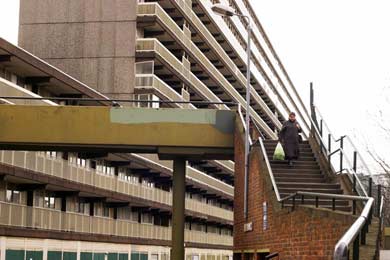|
Eamonn Dwyer looks at the issue none of the parties want to talk about - Britain’s housing crisis.
During the recent chancellors' debate, a pretty student asked under which party’s policies would she be guaranteed to buy a house.
Alistair Darling and George Osborne had already tangled on who should take the credit for cutting stamp duty for first time buyers. But nobody questioned the core belief behind the question – that it is a fundamental right in Britain for every citizen to own a house.
The wrongs of right to buy
Under the right-to-buy scheme, 2.5 million council homes have been sold.
 For many, this is one of Margaret Thatcher’s great achievements, and its enriching of a generation created a bedrock of working class Tories. For many, this is one of Margaret Thatcher’s great achievements, and its enriching of a generation created a bedrock of working class Tories.
But there was no provision for replacing the depleted housing stock. For Thatcher, this was a deliberate policy of reducing the state’s role in the market. Yet under New Labour, even fewer homes were built than under the Conservative administration. In Tony Blair’s very first speech as prime minister, delivered from the kitchen-sink Aylesbury Estate, he declared there would be an end to ‘no-hope areas’.
As Compass puts it, New Labour ‘inherited two fundamental ideological assumptions that had driven government policy on housing from the Thatcher/ Major period; that home-ownership was the essential basis of citizenship and should be promoted, and that the market could be relied upon not just to deliver market housing, but also to enable the provision of affordable housing.’
The results of this ideology have been clear to see: 2.5 million people in overcrowded homes, 4.5 million people on the social housing waiting list, millions more put off from even applying by the unlikelihood of getting a house, extortionate rents, and a massive asset bubble contributing to the financial collapse.
The sink estate trap
When I worked at a housing association in North London, the view among managers was that social housing was residual and in long-term liquidation, that stock would eventually be reduced to a few emergency holdings. Ironically, I was living in Camden in an ex-council property paying an extortionate £100 a week rent.
 Aspiring homeowners are often forced to live in substandard, cheap accommodation for years on end while they scrape together the money for a deposit. Those reliant on social housing desperately cling on to their secured tenancy. Take the Heygate Estate in London’s Elephant and Castle. This massive block of social housing is due to be torn down and has been partially evacuated. Dozens of residents have been forced to remain in its crime-infested, dangerous corridors (which were used as the location for vigilante film Harry Brown and teen gang drama Shank) because the council won’t provide them with alternative housing. Aspiring homeowners are often forced to live in substandard, cheap accommodation for years on end while they scrape together the money for a deposit. Those reliant on social housing desperately cling on to their secured tenancy. Take the Heygate Estate in London’s Elephant and Castle. This massive block of social housing is due to be torn down and has been partially evacuated. Dozens of residents have been forced to remain in its crime-infested, dangerous corridors (which were used as the location for vigilante film Harry Brown and teen gang drama Shank) because the council won’t provide them with alternative housing.
Yet instead of reforming a policy which has taken a disastrous toll on the welfare of Britain, both Labour and the Conservatives are still fully committed to increasing home ownership and reducing public housing. With cutting the deficit dominating the mainstream narrative of the election, only the Green Party have advocated large scale state investment in social housing.
Stuck in the (political) middle
By contrast, Labour’s manifesto promises to ‘enable more people to get on the housing ladder'. The one mention of intervention at national government level is to ‘develop a new form of affordable housing targeted at working families on modest incomes who struggle in the private sector and rarely qualify for social housing. This will focus on enabling working people to rent an affordable home at below market rates while they build up an equity stake.’
The Liberal Democrats' big housing proposal is the old 'empty homes' ruse, a version of the efficiency savings they deride in other parties' budgets. I still remember Labour leader John Smith delivering an election broadcast from an empty towerblock and promising to fill up Britain's vacant homes. Whether this is something that could genuinely be achieved, or whether his successors had no interest in pursuing the policy remains to be seen; there are now one million empty homes in Britain. The Lib Dem proposal to bring 250,000 homes into the market is a drop in the ocean of demand, and isn't matched by a holistic approach.
Social housing is seen as a stop-gap, emergency option for the very poorest in society. As recently as 2007, in a long-forgotten promise to build five ‘eco-towns’ with 100,000 homes, Gordon Brown said he wanted to create a "home-owning, asset-owning, wealth-owning democracy".
 Later, during the home-losing, asset-stripping, wealth-destroying crash, Brown rejected a plan to build 100,000 homes suggested by prospective housing minister Jon Cruddas. Cruddas, to his credit, refused to take the housing position. Later, during the home-losing, asset-stripping, wealth-destroying crash, Brown rejected a plan to build 100,000 homes suggested by prospective housing minister Jon Cruddas. Cruddas, to his credit, refused to take the housing position.
It is rumoured Cruddas also proposed an ingenious way of creating emergency social housing and taking pressure off the banks; the government should buy homes that have come on the market through repossession and turn them into social housing. It could help solve emergency housing requirements, and the houses could be sold on at a profit if the government no longer wished to hold the stock. Brown rejected the plan out of hand.
To have is not to buy
The reasons people want to own a home are clear. It is a permanent way to escape poor-quality, overpriced rented accommodation. They are creating an investment in the property which enriches them over time, rather than the landlord. They can pass the home onto their children. They can buy a bigger, better home over time in a more affluent area.
But what if, instead of a fundamental right to buy a house, there was a fundamental right to have good quality housing? Would there still be a burning desire to own a home if the state could provide high-quality, rented accommodation, without social stigma, and was guaranteed to be available to their children?
As pleased as Thatcher’s children were with buying and selling their council house, there is growing resentment among their own descendants that they have been robbed of affordable housing. But the issue is not with right-to-buy as such, but right-to-sell. One of the reasons for right-to-buy was to remove the disadvantage those in public housing had to their home-owning counterparts; they could not take advantage of the equity in their homes. One novel alternative to right-to-buy is that property could only be purchased through a co-operative. Assets from sales or mortgage equity could be divested into the co-operative as a whole. This would allow co-operative members to benefit from the investment in their property without substantially reducing the housing stock.
 Indeed even the soft-left Fabian society criticised the ‘right to sell’ in a recent excellent policy report which advocated better quality, mixed public housing. Social housing design has improved dramatically since monstrosities like the Heygate. Take Angell Town in Brixton; formerly a notorious crack den, it’s won awards for its fantastic, aspirational design that is a world away from the concrete pavillions of the past. Indeed even the soft-left Fabian society criticised the ‘right to sell’ in a recent excellent policy report which advocated better quality, mixed public housing. Social housing design has improved dramatically since monstrosities like the Heygate. Take Angell Town in Brixton; formerly a notorious crack den, it’s won awards for its fantastic, aspirational design that is a world away from the concrete pavillions of the past.
Ultimately, it’s not the design of buildings that matters most, but the mix of people. Ernő Goldfinger’s brutalist monoliths were oft derided, but are now among the trendiest places to live in London. As the Fabian report notes, ‘too many ‘sink’ estates started life as model developments, but have been allowed to deteriorate. Hence the tendency of older, long established tenants of council housing estates to reminisce nostalgically about how lovely the place was when then first moved in, often contrasting this very unfavourably with its current state.’
Nye Bevan aspired to a Britain where "the doctor, the grocer, the butcher and the farm labourer all lived in the same street". Yet the mainstream cult of home-ownership consciously segments society into rungs of the ‘property ladder’. By implication, if you are not able to grasp the first rung and are reliant on social housing, you have no chance of success.
It may be old fashioned, but it is possible to achieve. I stayed with a relative in Tokyo, who pointed out that the boss of Sony lived down the street. It was quite common for those on relatively modest incomes to live next to billionaires.
No hope
Instead, we have the rise of gated communities, and Tony Blair becoming an exemplar for aspiration by moving into his £6 million mansion with minimal contact with his local community except for crossed wires from his fax machine and the roar of his helicopter.
From his speech about an end to ‘no-hope areas’, Blair pulling up the drawbridge with his 20 police guards could prove a fitting footnote to New Labour’s housing disaster.
|





 For many, this is one of Margaret Thatcher’s great achievements, and its enriching of a generation created a bedrock of working class Tories.
For many, this is one of Margaret Thatcher’s great achievements, and its enriching of a generation created a bedrock of working class Tories. Aspiring homeowners are often forced to live in substandard, cheap accommodation for years on end while they scrape together the money for a deposit. Those reliant on social housing desperately cling on to their secured tenancy. Take the
Aspiring homeowners are often forced to live in substandard, cheap accommodation for years on end while they scrape together the money for a deposit. Those reliant on social housing desperately cling on to their secured tenancy. Take the  Later, during the home-losing, asset-stripping, wealth-destroying crash, Brown rejected a plan to build
Later, during the home-losing, asset-stripping, wealth-destroying crash, Brown rejected a plan to build  Indeed even the soft-left Fabian society criticised the ‘right to sell’ in a recent excellent policy report which advocated better quality, mixed public housing. Social housing design has improved dramatically since monstrosities like the Heygate. Take Angell Town in Brixton; formerly a notorious crack den, it’s won awards for its
Indeed even the soft-left Fabian society criticised the ‘right to sell’ in a recent excellent policy report which advocated better quality, mixed public housing. Social housing design has improved dramatically since monstrosities like the Heygate. Take Angell Town in Brixton; formerly a notorious crack den, it’s won awards for its 
Housing is one of a number of key issues that are being totally ignored in this election campaign that The Samosa is focusing its coverage on. Not just before the election - but after the election too, when the public spending cuts start to take effect.
Watch this space.
Who put the animals in charge of the Zoo?